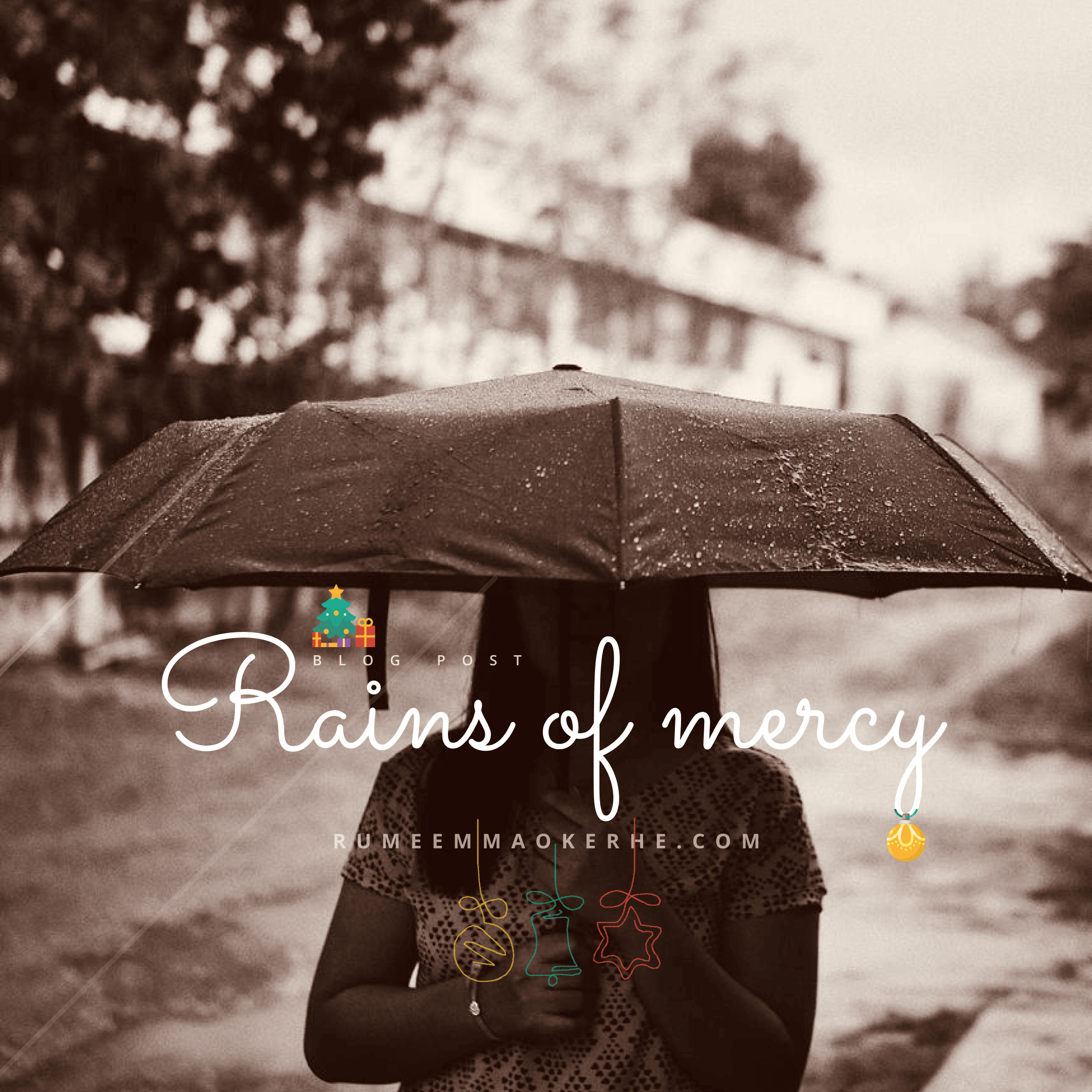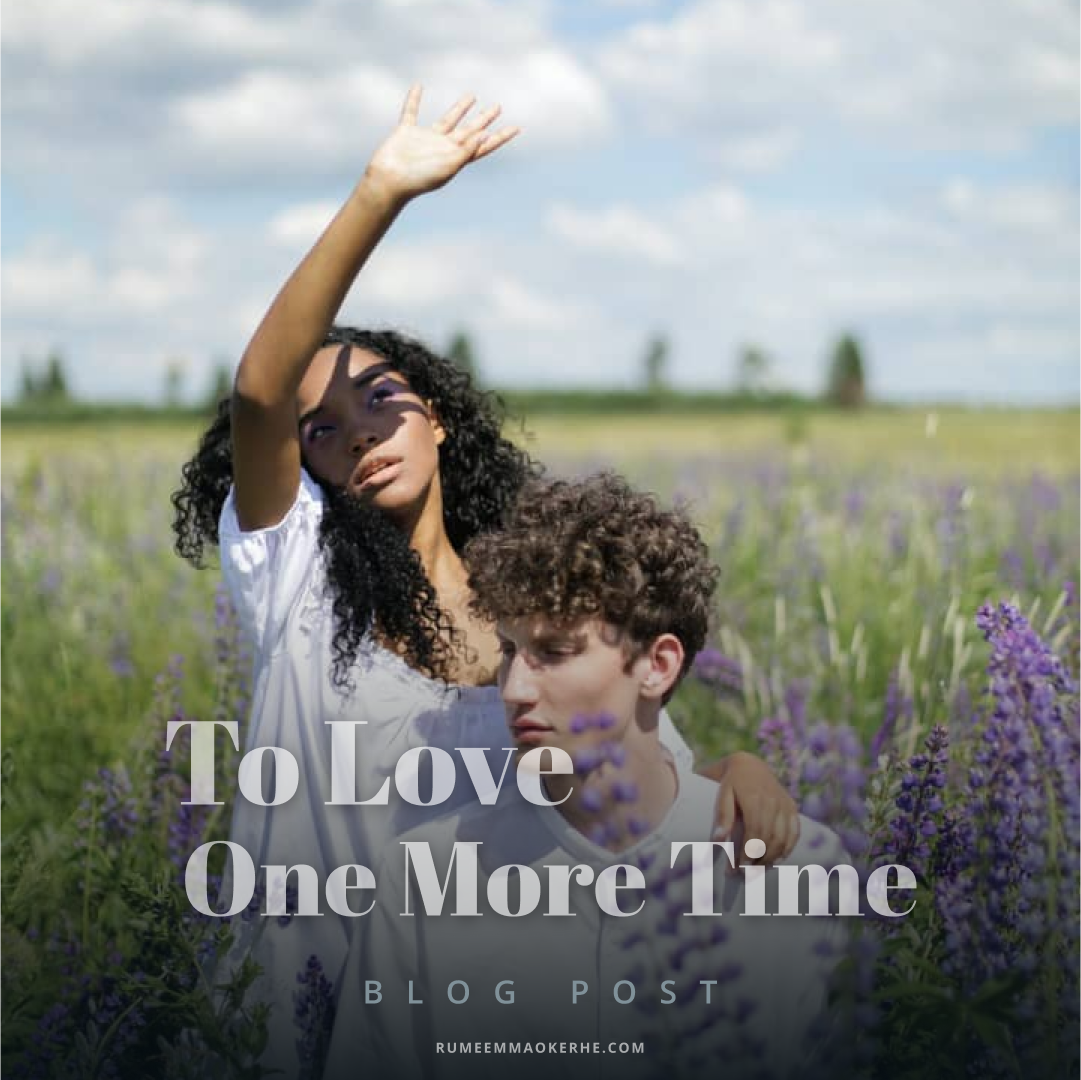
Rains of Mercy
Total Reading Time: 15 minutes Having parents serving in ministry meant being part of kingdom work oneself. As such, Tehillah

Miriam choked on the akara she ate when Mrs. Wells called her a brute. “Me a brute? Then I presume you’re worse than I am because you’re older and of course, you’re my aunt.” She chuckled and drank some apple juice, willing that her aunt let her eat in peace. “This tastes lovely by the way.” Commending the sweetness of the African snack, Miriam hoped the distraction would be welcomed. For all that mattered, she was satisfied with what she earned as it was sufficient to take care of her son, Samie and support her aunty, Mrs. Wells. There was therefore no use reaching for more than she could contain. There was no use aiming for more than she had been apportioned in life. That had been what had left her in her fixated state – the quest to change her fate. She had sworn to never again be plagued with the curse of discontentment. “I won’t be accepting the vicar’s offer. I don’t need the job.” Her voice was a fry, but it lacked determination.
Mrs. Wells furrowed her brows, noticing this. Her lips quivered but she refrained. A sigh. “I hope someday, you start to explore this treasure – you. So gbo?”
“I hear you.” Miriam lifted a shoulder, her eyes averted in indifference. As with her African roots, Mrs. Wells always made to remind her of things that once were but not anymore. Things like her beauty, talents, her dreams and aspirations. She stood from the dining table and picked her plate and Mrs. Wells’. “I hope I don’t become fat as a cow with these bean-cakes of yours.”
“I don’t mind feeding you fat.” Mrs. Wells gave a thoughtful smile and returned to an abolitionist pamphlet she had been reading.
Muttering thanks, Miriam left for the kitchen where she would do the dishes. The bubbles of the soap with which she washed resembled her former life. Six years ago, she had been a slave desirous of freedom and willing to pay any price. She had not considered the possibility of betrayal or abandonment when Mr. Fredrickson, Samie’s father professed his love for her beneath the shade of a mulberry tree, on her master’s homestead. He had tipped her chin and had sung her name, sweet as the melody of a piano forte. Miriam, my Miriam. She remembered the coyness of his voice, the slippery tone only a fox could possess. “I could help you get your manumission. What? Do you really think I take no thought of your wellbeing?”
Overcome with hope, Miriam had melted in his arm as ice would on hot slab and had swiveled into a merry-go-round of unrestrained affection. It had not taken five months however, for Samie’s father to prove that he was neither what he said or inferred. Miriam dried her wet hand with a napkin, trying to ignore the hurt that followed the realization of her pregnancy. Had God not been merciful to her, had He not sent Mrs. Wells who came to her rescue and offered Miriam’s master money he could not resist, for Miriam’s manumission, she would have died – both she and Samie. That mercy, she long concluded she had exhausted, though within she craved for a home and a man to call her own. She returned to the parlour, sat cross-legged on a stuffed chair and busied with a jacket she had been knitting. She thought again about the offer to cook in the vicar’s home and decided to continue with her job at the alehouse. Although the vicar would pay more, she preferred the alehouse because it shielded her insecurities. There she felt unseen, and even if her proprietor, Mrs. Phoebe seemed to sense her struggle, she was grateful she never probed. Her gentle smile and kindness seemed sufficient.
Miriam hemmed the sleeves of the jacket with an intricate tapestry of flower patterns. She smiled, admiring the product of one of her many talents. Like Miriam’s late mother, Mrs. Wells always reminded Miriam that she was fierce as the wind. “You’ve got passion in your heart and fire in your eyes. Any man who finds you will be lucky he did.” Miriam ignored the thought, and with it, the longing for company as she would a jester at a circus. She was certain no one could want her, at least not after knowing the ignorance of her past.
Mark mounted his bicycle after delivering the newspapers on Clark’s street. He waved, greeting customers and continued to Simon’s street where he would stop by a friend’s coffee shop. Westminster as usual, bubbled with the liveliness and frenzy of London. Horses screeched from carriages and hurrying feet clicked against cobblestone paths. By the walkway, he secured his bicycle to a pillar and walked into the shop. He ordered a cup of coffee and sat by an empty table.
“You look like you’ve just been granted some favour by the king.” Thomas smacked his arm and took the opposite seat.
“I shouldn’t be in your coffee shop then.” Mark laughed, sipping the hot drink. “You should award me some prize for loyalty, you know. I come here more often than a snail crawls into its shell.”
“For a friend turned brother, I could never say no.” They both chuckled and discussed how their lives were going. “Mabel got a new job working with Phoebe Willoughby. You know her, right? She runs an alehouse some streets from here.” Mark said he did, and Thomas explained that his wife hoped to learn to cook African dishes there.
“Interesting.” For the bond of their friendship and legacy of his wife, Mark was grateful for the little ways Thomas showed thoughtfulness. Louisa, his late wife, had been involved in the abolition movement against the slave trade, and by extension, he had taken a liking for Africa. Mark finished the cup of coffee and Thomas asked if he would like some more. “This is fine. I should get going.”
“Very well then.” Thomas stood to escort him. “From what Mabel says, you might enjoy their African cuisine.” They shook hands and Mark thanked him. “Anytime. See you in Church.”
Mark mounted his bicycle again and continued with his job. He made a mental note to visit the alehouse as Thomas had recommended. Since losing his wife, he had made a habit of redoing old activities and places he and her once shared. Grieving for him, meant reminiscing sentiments and clinging to them as though reality were not existent. He recalled the pain following the first few months of Louisa’s passing – the hollowness in his chest and the heaviness in his head. Years after, he still felt a fear at commitment. Lord, I know You make all things work together for the good of those who love You, but please forgive my unbelief. Questions and uncertainty clouded his senses as morning haze over the Thames. He had no idea where his life was headed but strove to believe. Lord, help me muster the little faith I’ve got. The hurt of solitude sometimes wore on him, but he looked no woman’s direction. Better he be single and be without cause to hope, than allied to both another and a constant fear of loss. He recalled the first time he had made his intentions known to Louisa – the joy on her face and the satisfaction in his heart. They had been childhood friends and thus, shared same passion for music, classics and logic. Poor, they had both not been privileged to receive formal training while growing up, but they had shared his dream of attending Oxford someday, and his ending up maybe, a member of parliament. “It doesn’t hurt to engage in such ambitious fancies, I dare say.” She smiled, her clove-shaped lips pulled broad apart.
“No, it doesn’t. And I dare say that I, no, we,” Mark, corrected himself, grinning. He pulled her hand, so she tottered towards him. “We will have a large homestead with lots of children and carriages and. . .”
Mark put away the memories, tucking them into safe recesses in his mind as he did their letters into a chest. He would always cherish Louisa. He could never love another.
Miriam mixed water and milk for cheese, set the pan in the oven and continued to make syllabub. Every meal – African, English or Italian attracted a pack of hungry lions. Mabel, Fiona, Andrew, cooks as herself, hurried between dishes, ensuring they met the growing demand.
Spoons clicked against pot, knives against chopping boards and the smell of spice and vegetable filled the alehouse. When most work had been done, Miriam stepped away from the kitchen to catch fresh air. Her skin itched with sweat, her hair with heat. She took a handkerchief from her pocket and wiped her face with it. Sitting by an unoccupied table, she caught sight of the organist at the Westminster Abbey where she as well as Mrs. Wells and Mrs. Phoebe attended. He was eating krin-krin, fish balls and drinking syllabub. The act fascinated her. She did not realize her brows were raised. The man caught her looking so she thought to smile. He returned the smile. “You know this is a funny mix―krin-krin and syllabub.” She said, walking towards him without thinking. She realized how rude that might have felt to him and muttered an apology. “I certainly never considered it a possibility to have krin-krin and syllabub together.”
“No, it’s nothing to apologize about.” His smile had a warmness that Miriam had not envisaged. “I get that most of the time.” He had long, crooked nose and curly, caramel hair Miriam guessed would fit his oblong face more had he let the curls fall more freely.
For fear that she could be considered impudent, Miriam kept that opinion to herself. Instead, she told him of how uncommon it was to find an English man who ate African food as often as she inferred he did. “If I’m not mistaken that’s what you’re saying.” He hmmed an affirmation and she asked why he did. “I have some minutes off work, so I don’t mind sitting to listen.” She pulled the chair beside and sat, laughing. Wondering at her boldness, as it was not like her to initiate conversations with strangers, she guessed he must be special. Somewhere within, she felt an awkwardness at thinking of him as special, but she reassured herself that there was nothing wrong in making a new friend. “You’ve not always eaten African food, have you?” The organist hesitated a little and she asked if he did not mind her asking.
The cook’s question brought back memories. Mark remembered calling Louisa silly for trying such food combination but had liked it after she coaxed him. “I have not. I started to eat some years ago and then found it capriciously satisfying indulging in a mix of both English and African dishes.”
“Capriciously satisfying huh?” Miriam liked his sense of witty humor. She laughed a little too much, she felt her inside turn. “I have never thought of having African and English dishes together.”
“Oh, I can tell you how much you’ve missed. You should also try akara with cheddar cheese. Not so much cheese though. It’s heaven.” The cook chuckled again, and Mark noticed the perfect dentition, her wavy hair which sat over shoulder with an elegance and grace. Her eyes were dark as chestnut, and in them, he saw something. He was not sure what it was, but something about her struck.
Miriam felt a sudden rumble in her inside when she continued to speak and laugh with the organist. He had more knowledge of African meals than she would have guessed and now, she was wondering if she could know more about him. Perhaps he could make a good friend. And would he not mock and judge her when he got to know her―if they would ever get to really know themselves? She reined her mind running wild with anxiety like a mad horse. The organist smiled at her, telling her of the excellence of the krin-krin and she felt a pull towards him. Deep, long, strong.
“The kitchen. I have to return.” She informed him, her manner hasty.
“Okay. Nice to meet you,” Mark waited for her name. Miriam. He tested it in his mind and liked its cadence. “See you around, Miriam.”
Miriam smiled but within, the calm tides of her mind had been set turbulent as the waves of the Irish sea.
When Louisa first voyaged to Africa as a cleaner, she had returned remorseful for the hurt she had seen people go through. It was this same hurt that had led both her and Mark to the Lord and had birth a new cause for their lives – reaching out to grieving people. Louisa had been drawn to Africans and Mark had taken interest in their lives. Their food, culture intrigued him. Maybe that was why he found himself thinking about the African cook, Miriam. Maybe she needed help in some way. Maybe she was still hurting from the consequences of the slave trade though it had been abolished by the House of Lords three years ago. Mark raked his hand through his hair and thought to reach out and extend a helpful hand, but he changed his mind. How would she perceive his action? He was a man of honour and careful deliberations, he would not fiddle with her like a plaything. His chest tightened when he thought of the African cook in that manner. But cautious, he shoved the thought of helping her aside and refocused.
Weeks passed with more customers trooping into the alehouse and with them was Mark. Once, Miriam had seen him at Church and had walked up to him to say hi but never had she again. He had been surprised to see her but had not given anything more than a perfunctory cordiality. Miriam chided herself for expecting so much when they were just a greeting from strangers. She assumed he was engaged to some lady somewhere and was honouring his commitment, of which Miriam would respect, but again chided herself for thinking about that. Of what concern to her was his been marital condition? She found herself wondering at this again and concluded that if he was much older than his childly look, then surely, he was two Saturdays to been married. “To someone worthy of him of course.” Miriam caught herself soliloquizing and told herself to stop the madness. She walked out of the kitchen to take a break and found Mark sat by an empty table, same way she had the first time they met, only this time he was eating jollof rice instead of krin-krin. She was pretending to not see him when he looked her way and gave a warm smile. It warmed her inside and she started to feel like an infatuated teen. What was this confusion, this turmoil? She returned his smile with a perfunctory bow. She was about walking past when he stood and called to her.
“I would like to speak to you. In private. I’ve got questions I hope you don’t mind answering.”
That afternoon, after they were both done with their jobs, they took a walk around Hedsor and talked of their past, present and a future. She told him about Samie and he told her about Louisa. Hours passed, and the setting sun cast its hue against them. They walked past the Thames and on their way back home, Mark said, taking Miriam’s hand, “I want a future with you in it.” He still grieved Louisa, but he trusted that God would teach him to love Miriam and accept her for who she was. “What do you say to love one more time?”

Total Reading Time: 15 minutes Having parents serving in ministry meant being part of kingdom work oneself. As such, Tehillah

Total Reading Time: 15 minutes Listen to audio version Frustration burned within Lisa, fervent as the crackling coals at the
12 Responses
This piece is amazing…as usual :)…the cultural inclusivity is wonderful…I look forward to more.
Thank you, Tosin! I’m glad you loved it!
Wow, this is so relatable.
Mixing English with African… that’s beautiful.
Can’t wait for the complete book.
Hehehe thanks Thona. *hugs*
This story is really inspiring… I was deeply blessed! God bless you for this amazing piece.
I’m glad you were. Thank you for reading *hugss*
Wow…this was a good read. The story is beautiful and inspiring and the writing and flow of words is excellent. Nice one 👏🏽
Thanks Jolaade *hugsss* I’m glad you loved it!
This is really amazing, how you vividly described the setting. What do you read sis?😅
Amazing lovely piece!
Hehehe. Many thanks, Gideon!
Very nice and inspiring read. I’m impressed by how the story was thoughtfully scripted. Keep up the good work
Thanks, Dunni! God’s blessings always.